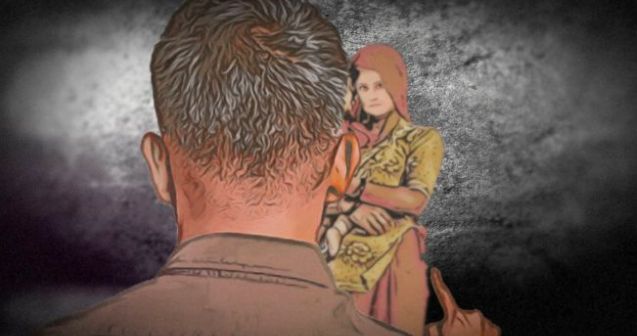Why Does She Stay? Domestic Abuse Looks Very Different from the Inside
By: Lisa M. Hayes
It’s one of the most confusing aspects of domestic violence, and the answers are complicated.
It happens more often than it should. The conversation with a client starts like this, “I don’t know if he’s abusing me or not.” Right then and there at that moment, my heart sinks because I know that woman wants two opposing things from me. Part of her desperately wants me to tell her what’s going on is normal. It’s alright, and she’s going to be alright. The other part of her wants me to hear her and validate her fear and pain. She wants and needs saving.
Now, don’t get me wrong. I know it’s not always men abusing women. I had a male family member killed at the hands of his fiancé in the most horrific kind of domestic abuse incident. She shot him at point blank range in front of her own children. She’d been abusing him for years. However, statistically, women are at a much higher risk for being victimized.
Webster defines abuse as, “the use or treatment of something in a way that causes damage.” That’s broad because abuse comes in many forms. If you’re asking yourself the question, “Am I being abused?” the answer is most likely yes. Abuse comes in many forms that don’t involve physical violence, and physical abuse comes in many forms that don’t involve being hit.
In one of my lifetimes, so different than my life now it seems like it was in another galaxy, I was in a relationship with an abusive man. He was an Iraqi War vet. At first, I interpreted his behavior as PTSD symptoms. Looking back, he probably was having PTSD symptoms; he had an official diagnosis to show for it. However, I quickly let that diagnosis become an excuse or a catch-all explanation for his behavior, and the result of that was total devastation in my life.
This man never once hit me. He did throw a gallon of bottled water at my head, leaving me with a concussion and a broken tooth. He threw things and broke things a lot. He would tower over me, fists clenched and red-faced, screaming while I rocked on the floor in the fetal position. He would physically restrain me from leaving when I tried to get away. He left bruises on my arms from holding me too tightly many times. He would hide my car keys. He would threaten to drive off the road, to kill us both while I was a passenger in the car. He once took the wheel while I was driving, putting my car in a ditch. He threatened more times than I can count to kill himself, and on more than one occasion brandished a weapon to illustrate his point.
I knew for sure it was never going to end. He told me that every day. I knew he would never leave, or let me leave. So I tried like hell to make the best of every day. I even desperately tried to like him. I would do anything to try to prevent the next unpreventable explosion of rage. I reached a point where I avoided going out in public with him at all costs because he could get me to do just about anything simply out of fear of him humiliating me in front of others.
He got ultimate control by threatening to kill my son and “destroy” my friends.
And yet, I emphatically denied being abused. People around me were concerned and asked more than once. I was indignant. My son, 14 years old when this began, told a neighbor my boyfriend was abusive. When that friend called me on it, I responded by forbidding my son to talk to the neighbors. At the very time this was happening in my life, I was on a fundraising committee for the local domestic violence shelter.
Was I lying to myself and everyone around me?
No.
I was quite literally not in my right mind. I stop just short of saying I was insane, although I probably was.
Survival brain is different than rational brain. As humans, when we are in life and death situations, the reptilian brain takes over. Rational thinking is trumped by survival instinct. We refer to this as the fight or flight response. However, in most cases, a victim of domestic violence is in survival based fight or flight for months, or even years and they can neither fight nor flee.
The result of that is a person who cannot clearly assess what’s happening to them and or around them. They can’t think about tomorrow because they’re just trying to avoid the pain of today. When they can’t avoid the pain, they go deeper within themselves.
It looks like shame and denial, and some of that might be there. In my case, I certainly didn’t want to admit to anyone what was happening. However, I wasn’t motivated by shame. I was motivated by one thing, and one thing only: stay alive and protect my child. That motivation led me to some very dangerous places, but I couldn’t do it any other way.
I always say, “You can’t reason with crazy.” When someone is a victim of domestic violence, it’s very, very difficult, if not downright impossible, for them to see “reason.” Their brain will only allow them to see what’s immediately in front of them for survival purposes, and reason takes some forethought.
My nightmare ended in a situation that escalated beyond my control. He’d finally gotten a job. He was in a magnificent mood and wanted to go out to dinner to celebrate. He wouldn’t take no for an answer. On the way home from a relatively peaceful dinner, he pulled off the freeway at a casino. I didn’t want to go in with him. I knew where it would go when he started drinking. Security cameras caught him pulling me out of the car and dragging me across the parking lot by my hair, crying. Tribal police were called.
I thought that night they’d arrest him and take him away. I sobbed with relief on the way home, thinking it was finally over. It wasn’t. After I’d given my statement and was cleared to leave the scene, the tribal police gave him a stern talking to and let him go. They told him he needed to “learn to deal with women better.” He went inside the casino, drank, and then got a taxi home. It escalated into the kind of horror I’d spent almost two years trying to avoid.
Before the next day ended, three law enforcement agencies, the domestic violence agency I’d worked for, and three friends, including one who went to my home with a gun to retrieve my dogs, were all involved. It ended as I was escorted out of town, away from the home I owned, by the police, on my way to an undisclosed friend’s house.
The last time I saw him, he was holding my son and me at gunpoint. I believe it’s only by the grace of some force outside of us, that he didn’t kill us.
The first night away, sleeping in a hide-a-bed, next to my son, I woke up at 3:00 a.m. screaming in fear and terror, while simultaneously crying because I missed him. My son looked at me blanking, and told me I had Stockholm syndrome; smart diagnosis for a 15-year-old.
I was sick, broken, tired, and lost. I’d lost myself and my mind in trying to survive. The thing is, I did my best. I did survive. No one died. Not even our abuser. But my business was failing, my finances were destroyed, and every other personal relationship I had was strained, some of them were irreparably broken. It’s been almost eight years, and I’m still cleaning up damage caused during those two years in some dusty corners of my life. However, my heart and head have healed.
They say you can’t judge a person until you walk a mile in their shoes. True story. I used to take a very hard-line about women who stayed in abusive relationships. I couldn’t understand why anyone would stay in a situation like that. I may not have ever said it out loud, but I’m sure I thought something along the lines of, “If you stay, it’s on you.”
More than 1 in 3 women (35.6%) and more than 1 in 4 men (28.5%) in the United States have experienced rape, physical violence, and/or stalking by an intimate partner in their lifetime.
About 1 in 4 women (24.3%) and 1 in 7 men (13.8%) have experienced severe physical violence by an intimate partner.
Nearly half of all women and men in the United States have experienced psychological aggression by an intimate partner in their lifetime. (48.4% and 48.8%, respectively) (National Intimate Partner and Sexual Violence Survey (CDC) 2010).
Not all of those people can be too stupid or too lazy to get out. I’m not stupid or lazy, and it happened to me. And still, that bias isn’t surprising. People who haven’t been there can’t see it clearly. You can’t possibly understand how quickly a smart person can lose their ability to make rational choices when the way they think is muddled by fear. It happens very, very quickly.
It’s been said that pornography is very hard to define, but you know it when you see it. Domestic abuse is a lot like that. Sometimes, especially in the fray of survival, it’s hard to define, but you know it when you’re experiencing it, and it’s for the victim, and only the victim to make that definition. The fact that it’s confusing might be the first clue you’re in trouble. You don’t need an “approved” excuse to get out of a relationship. If you’re wondering if you’re being abused, the semantics don’t even matter anymore. Something is going on and whatever that something is, it’s not good, and it’s enough. Look for help until you find it. Get the support you need and get out.
Lisa Hayes, The Love Whisperer, is an LOA Relationship Coach. She helps clients leverage Law of Attraction to get the relationships they dream about and build the lives they want. Lisa is the author of the newly released hit book, Score Your Soulmate and How to Escape from Relationship Hell and The Passion Plan.





